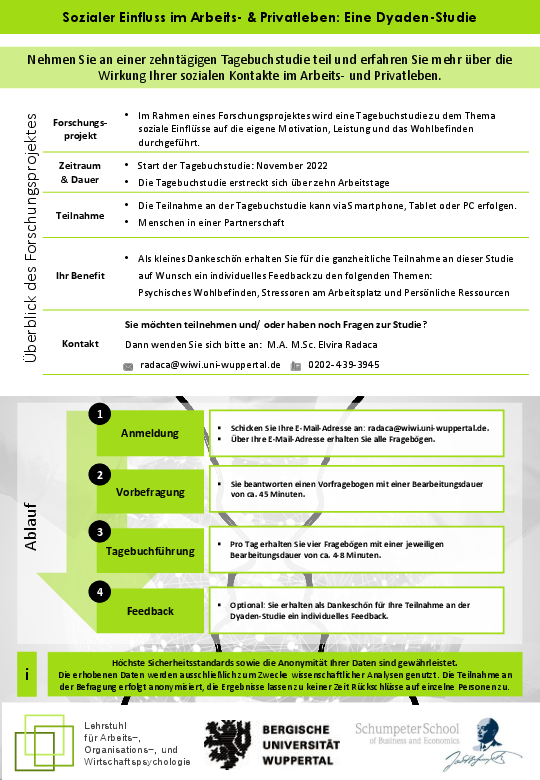Dyad study - Romantic partners

Do you know the feeling that the weekend was once again far too short and you couldn't really relax? Your mobile phone is constantly ringing and despite the days off you check to see if any new emails have arrived. But maybe there is someone who can help you switch off mentally from work-related demands. With increasing digitalisation, recovery processes are playing an increasingly important role in the world of work. Mental well-being, motivation and performance can be affected by the mix of private and professional life and the lack of rest. Partners can often make a major contribution to recovery and work-life balance. This social influence will be analysed by considering dyads in both work and private life.
- Topic of the study: Social influence in work and private life
- Study design: Diary study
- Processing time: Preliminary survey (approx. 45 min), then 4 short questionnaires (approx. 4-8 min) on each of 10 working days
- Survey period: From November 2022
Before starting the preliminary survey, we ask you to coordinate with your participating partner(s). After you have defined ten working days and selected them at the end of the survey, you will receive four short questionnaires at different times on each of these days. The times are based on your specified start and end times. No coordination between your participating partner or partners is required with regard to working hours. You will receive four questionnaires per day at the following times:
- Two hours before starting work
- Two hours after starting work
- Two hours before the end of work
- One hour after the end of work
The first general questionnaire takes about 45 minutes to complete (excluding three minutes for the attention test). The daily questionnaires take approx. 4-8 minutes per questionnaire.
At the end of the study, each participant has the opportunity to receive individual feedback on the topics of psychological well-being, stressors in the workplace and personal resources.
Our research results are then published in relevant specialist journals. This is done in anonymised form. It is not possible to draw any conclusions about you personally.
If you are interested in the study or have any questions, please contact Elvira Radaca:
radaca[at]wiwi.uni-wuppertal.de

